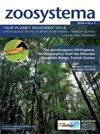The Mediterranean species of Hornera Lamouroux, 1821 (Bryozoa, Cyclostomata): reassessment of H. frondiculata (Lamarck, 1816) and description of H. mediterranea n. sp.
IF 1.2
3区 生物学
Q3 ZOOLOGY
引用次数: 3
Abstract
ABSTRACT Hornera Lamouroux, 1821, a genus which includes large, rigidly erect, ramified and highly calcified cancellate cyclostome species, is represented in the Mediterranean Sea by two species, H. frondiculata (Lamarck, 1816), the type species of the genus, and a species previously left unnamed or wrongly attributed to the northern H. lichenoides (Linnæus, 1758), and classified under this name as threatened in the Mediterranean (Barcelona Convention, Annex II). On the basis of abundant material including large, well-preserved colonies collected by diving, the distinctive morphological and ecological features of these two species are detailed, leading to the description of a new species, H. mediterranea n. sp., and to a better characterization of H. frondiculata. The current state of knowledge of the range of the two Hornera species suggests that they are endemic to the Mediterranean. Their depth and habitat distributions span from 30 to 100 m on both dimly lit rocky walls and flat bottoms with coarse elements for H. frondiculata, and from 55 to 200 m only on flat sandy bottoms for H. mediterranea n. sp., but both species can coexist in the same microhabitat. The distribution of H. frondiculata in two separate habitats is reflected in a remarkable plasticity of colony shape and branching design which optimizes food particle capture according to local flow conditions.1821年地中海种Hornera Lamouroux(苔藓虫纲,环口虫纲):对H. frondiculata (Lamarck, 1816)的重新评估和H. mediterranea n. sp.的描述。
摘要:Hornera Lamouroux,1821,是一个包括大型、刚性直立、分枝和高度钙化的松质环口动物物种的属,在地中海有两个物种,H.frondiculata(Lamarck,1816),该属的模式种,以及一个以前未命名或错误地归属于北部H.地衣的物种(Linnæus,1758),并以此名称被列为在地中海受到威胁(《巴塞罗那公约》,附件二)。根据潜水收集的大量材料,包括保存完好的大型菌落,详细介绍了这两个物种独特的形态和生态特征,从而描述了一个新物种H.mediteranea n.sp.,并对H.frondiculata进行了更好的表征。目前对这两个Hornera物种范围的了解表明,它们是地中海的特有物种。它们的深度和栖息地分布范围为30至100米,分布在光线昏暗的岩壁和含有粗元素的平底上,分布在H.frondiculata,分布在55至200米,仅分布在平坦的沙质海底。但这两个物种可以共存于同一微栖息地。H.frondiculata在两个不同栖息地的分布反映在菌落形状和分枝设计的显著可塑性上,该设计根据当地的流动条件优化了食物颗粒的捕获。
本文章由计算机程序翻译,如有差异,请以英文原文为准。
求助全文
约1分钟内获得全文
求助全文
来源期刊

Zoosystema
生物-动物学
CiteScore
2.00
自引率
10.00%
发文量
18
审稿时长
>12 weeks
期刊介绍:
Zoosystema is a fast-track and peer-reviewed journal, devoted to the inventory, analysis and interpretation of animal biodiversity. It publishes, in French or English, original results of zoological research, particularly in systematics and related fields: comparative, functional and evolutionary morphology, phylogeny, biogeography, taxonomy and nomenclature, etc. All articles published in Zoosystema are compliant with the different nomenclatural codes. A copyright assignment will be signed by the authors before publication.
 求助内容:
求助内容: 应助结果提醒方式:
应助结果提醒方式:


